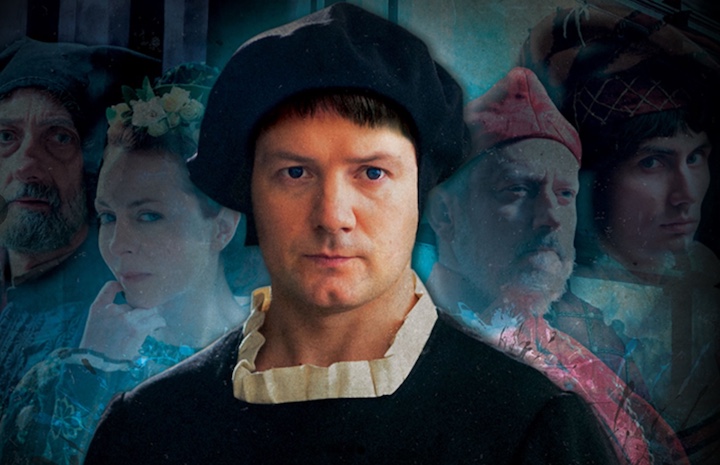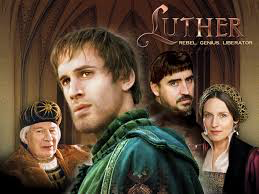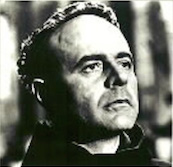So pop some corn, sit back, and enjoy my reviews. Like all critics, I do not claim my views are infallible and the only source of knowledge. They are just the thoughts of this humble pastor who was asked to do something he loves — watch movies! Also for obvious reasons, with it being the the newest of the three, I will have more to say about the latest incarnation of Luther on the big screen than its predecessors. The reviews will be in the order I watched them.
A Return to Grace: Luther's Life and Legacy – 2017 – Running time 105 minutes

The new Luther movie starring Padraic Delany as Luther was not what I expected. I went into the theater thinking I would be seeing a biographical picture similar to the 2003 Luther movie starring Joseph Fiennes as Luther. Instead, it was filmed in the style of a documentary although there are key scenes filmed in a biographical manner about Luther's life. An all star cast of Lutheran theologians, pastors, professors, synod presidents, and even Cardinal Dolan were interviewed to discuss the actions and importance of Luther's life. President Schroeder addressed the question as to why have a Catholic Cardinal in this film. He simply stated, "Even a Cardinal recognizes Luther's impact on the world."
There are two versions of the film that Thrivent funded. The script to the movie I saw, A Return to Grace, is loosely based on Pastor John Braun's book. The second version of the film, The Idea that Changed the World, is less theological in nature and recently aired on PBS. The ratings did very well. The overnight ratings surprised the network reaching somewhere between 5 and 7 million people. One can head to the PBS Facebook page and read the hundreds of comments. This film will also repeat five more times on PBS before being made available on Netflix in 190 countries. To God be the Glory!
After viewing this movie, the audience can first be proud to be Lutheran. Secondly, they gain a better understanding that all that Luther did shapes what we do today in family, marriage, and in the German language itself. WHAT DOES THIS MEAN? Finally one grasps the reality that Luther was, yes, just a man, but a man God used to restore the central truth of Scripture to his people.
A special shout out to the folks at the Watertown, Wisconsin, churches for allowing me to attend their showing of the movie at the old Towne Cinema.
A few other bits of trivia for you:
- The narrator in the movie was Hugh Bonneville, who played Lord Grantham in the mega-hit TV show Downton Abby.
- The film was shot in Poland. Why there? Poland was not devastated by the WWII bombs, thus much of the architecture from the era of Luther's life in the film looks authentic to the times.

Luther – 2003 – Running time 123 minutes
I remember the buzz about this movie as we had not seen Luther on the big screen for 50 years. Thrivent Lutheran had marketing items such as calendars that one could see plastered all over churches and classrooms. The movie also had some clout because it starred award winning actor Joseph Fiennes as Luther, with another famous actor, Alfred Molina as Tetzel. While the movie is more fast paced than the 1953 version and IN COLOR, Luther comes across as kind of a monotone aesthetic. The portrayal of Luther's theology is pretty shallow. This movie is slanted with more emphasis on the drama of Luther's life and not on the theology or the reformation that made Luther famous. That said, some of the bigger moments that lead to the Reformation such as the Diet at Worms can be seen and enjoyed. The movie is not a bad way to get your feet (or sandals) wet with Luther.
Martin Luther – 1953 – Running time 105 minutes

The singing of Luther's "A Mighty Fortress is our God" as the dramatic conclusion of this film gives can give one goosebumps. It also took me back to the first time I remember seeing this film as a child. It was my first real introduction to who Martin Luther was. The film covers the time from 1505 with Luther entering the monastery to 1535 with the dramatic climax of the film being Luther's "Here I Stand" speech. The film's script is fairly accurate. Noted Irish actor Niall MacGinnis portrays Luther as more of a grump who takes himself pretty seriously. That is a direct contrast to the playful side of Luther we see in the 2017 film. For its day this film won many awards and received great recognition for its director and the music. If one is looking to watch this film, I highly suggest you watch the 50th anniversary DVD version which includes new features such as a documentary history with Robert E. A. Lee, retired head of the Lutheran Film Associates.
What follows is my interview with Mr. Steve Boettcher, director of the new A Return to Grace: Luther's Life and Legacy movie:
1. One of the knocks of the 2003 movie was the pacing of the movie. Some commented that it is difficult to fit Luther's entire life into a two hour movie. How did your movie overcome that challenge?
"Of course, that is always a challenge for any movie. But two hours is actually a lot of time. The key is to have a focus. Our goal was to stick to Luther and his struggle. If we had more time, we'd get more deeply into the other players in the Reformation, from Calvin to Melanchthon to the Catholic counter-Reformation etc."
2. The idea to have commentary from many noted "Lutheran" and non Lutheran speakers was brilliant. How did that idea come about to film the movie more as a documentary.
"A lot of historical dramas don't give the audience the necessary context. For example, BBC's "Wolf Hall," about Thomas Cromwell, was opaque, because viewers had no idea who the characters were. You literally had to stop their film and check Wikipedia every 5 minutes. There are two ways to handle that. You can either have the characters give their backstory in dialogue — which is often unnatural and awkward — or you can have narrators and interviewees provide the context. We did the latter."
"One good example of this is the scene with Luther in the lighting storm. One of the interviews talked about how 500 years ago people equated storms and acts of nature as acts of God. Luther saw the storm as God sending him a direct message. The interviews help the audience understand the time period and the impact."

3. A follow up to 2, what do you say to the few who may feel (spoiler alert) that having Cardinal Dolan in the film is distracting or not good?"
"No one 'owns' Luther. To do a fair film about him, we need to see him from all angles, a 360 degree view. We wanted to create a historical film on Luther and hear from many different perspectives. That gives the film credibility. And who wouldn't want to hear what Cardinal Dolan thinks about Luther? (interesting fact, on 'owning' Luther — in the past 100 years the greatest volume of books published on Luther has been by the Baptists, not Lutherans.)"
4. How much did the other Luther movies influence your movie — positively or negatively?
"The 2003 film took so much flack on historical accuracy like showing Luther preaching while strolling in the pews, we made sure we had our historical details as accurate as possible. We even made sure the colors of various nobles' coats were spot on. Notice how when Luther hears confession, it's not in a booth — that innovation came a few decades later. Similarly, every line Luther speaks are his words, documented in writings and sermons. Even the 1950s film can't say that."
5. The movie is based on Professor John Braun's book. Explain the process of how it goes from book to the big screen?
"John's book is a great resource. We recommend John's book as a follow up to anyone who has seen the film, for a deeper dive into what Luther was all about. "
6. Many directors will say working on a project changed them or helped them see things differently. Did that happen for you on this film?
"It's clear that Luther wasn't perfect. In making the film, we saw all his flaws. But that just made him more human, more relatable. It's better to see Luther as a real person, not a statue."
7. What's next for BT Media?
"We're working on a film on Paul."
8. Any closing comments to leave with our viewers about the Return to Grace movie?
"I have to say my colleague Mike Trinklein wrote an amazing script for the movie. I can't tell you the number of people we've heard from that said 'I finally get it!'"
Conclusion:
We thank Mr. Boettcher for his time and you for joining us on this heroic adventure to get to know more about the films about Martin Luther, who never claimed to be a hero, but is a hero and champion to many Lutherans.
Where to view them:
1953 Martin Luther
- Check your local church library to see if they have a copy, or purchase your own at Northwestern Publishing House.
- You can also view it on YouTube.
2003 Luther
- Your local church library might have a copy of this too, or purchase your own at Northwestern Publishing House.
- For viewing on YouTube, search there for "luther joseph fiennes full movie english." I'm not recommending any of these sites, but they are there.
2017 A Return to Grace: Luther's Life and Legacy
- The 2017 Return to Grace Movie can still be viewed when scheduled in select theaters,
- or it can be ordered from Northwestern Publishing House.
2017 Martin Luther: The Idea That Changed the World
- This "less Lutheran" version is scheduled for several more screenings on PBS, and then it goes to Netflix.
- It's also already on YouTube.
Following are some additional reviews and comments on these movies.
1953 Martin Luther
2003 Luther
2017 A Return to Grace: Luther's Life and Legacy
2017 Martin Luther: The Idea That Changed the World
- Patheos - has a trailer
Return to original language with "show original" button at top left.

Discussion
My favorite version is the classic 1953 version...The Noir feel and cinematography is fantastic--though blacklisted as a communist in the Red Scare, Irving Pichel's directorial work is an important part of film history--and I think his expertise shows through in this film. I would say that MacGinnis' portrayal of Luther isn't so much as a "grump," but rather "very serious." He does a good job of portraying the heaviness of the Law that Luther was burdened under at the beginning of his ministry. It's true, you don't get much of Luther's humor and Gospel joy coming through, but the climax and end of the movie is the famous "Here I stand" dialog before the Diet of Worms. There were happier days ahead for Luther... In my humble (not an expert) opinion--that is some great acting--especially at the end... It gives me goosebumps every time!
For any Pastors or Teachers, I highly suggest the condensed version of this movie available through LutheranVisuals.com. ( http://www.lutheranvisuals.com/Store/martin-luther-30-min..html ) At 30 minutes in length, it's great for a quick Reformation Study or with the Confirmation Classes (though Black&White my Jr. High kids seem to enjoy it)! I end up watching through this 2-3 times each year!
Your reviews of three Martin Luther films were delivered with a great sense of humor that made them enjoyable to read. I also appreciated the way that you highlighted strengths and limitations of each interpretation.
Reading over your endorsement of the storytelling approach selected by Boettcher/Trinklein, I wondered what “dream panelist” (or panelists) you might have imagined adding to the recent drama-mentary to pursue the 360 degree view Steve Boettcher discusses in your concluding interview. If you could have added one “talking head” to the segments expanding on Luther’s significance, what voice or voices do you think might have offered provocative additions or a perspective that wasn’t already featured?
Thanks for your contribution to the conference.
Thank You for your reviews and interview with Mr. Boettcher! I appreciate your use of humor throughout the reviews which makes this a very easy read. I also appreciate how you addressed Cardinal Dolan being in the new film, as that is seen as controversial to a lot of the viewers.
As I read your review for the oldest Luther film I was pleased to see that you noticed how different the two Luthers were played between the oldest and the newest film: "Noted Irish actor Niall MacGinnis portrays Luther as more of a grump who takes himself pretty seriously. That is a direct contrast to the playful side of Luther we see in the 2017 film."
I do have one question for you Pastor. What method of telling Luther's story do you personally prefer? Do you prefer the documentary style like the 2017 film, or do you prefer the biographical film like the 2003 film?
Thanks again for your contribution!
Thank you for your thoughtful reviews on the different Luther movies. I enjoyed reading the reviews and the interview at the end. It has been awhile since I have seen the 1953 and 2003 versions, but while reading your reviews I remembered how the 2003 version was very fast-paced and showed a different Luther than the 1953 version.
“After viewing this movie, the audience can first be proud to be Lutheran. Secondly, they gain a better understanding that all that Luther did shapes what we do today in family, marriage, and in the German language itself. WHAT DOES THIS MEAN? Finally one grasps the reality that Luther was, yes, just a man, but a man God used to restore the central truth of Scripture to his people.” I appreciate what you said here. I never really realized how much impact Luther had on family and marriage until a recent lecture I had heard about Luther and after watching this movie. I think when most people think about Luther, they only think about the Reformation and his role.
Is there anything you would change about the 2017 version? Why or why not?
You give a nice little review of the movie, something a person could read beforehand
Tried to make it interesting? The 2003 one, so more people would watch it and like it?
While all three are very interesting movies , it seems that the 2017 version is the best one in portraying Luther without being too dramatic. Is there anything you would change about the new one? Why or why not?
Thank you again for your contribution!
As for the last paragraph, Anything to change -Nothing! Love it as is!
There was another movie starring Stacey Keach as Luther that came out in 1974 and I have to confess I haven't seen it. It may be worth looking up. Thanks for the encouragement in your article to watch the versions of Luther that have been put forth in the movies. Every time a Luther movie is shown it can inspire a conversation about the Reformation and Lutheranism.